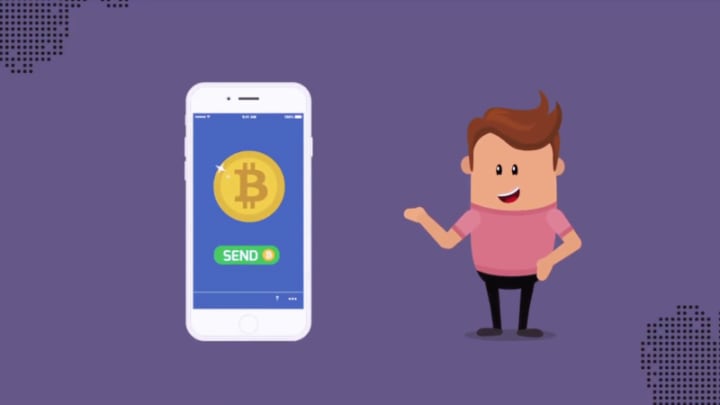
Back when Bitcoin was still new, there were a select few people who were willing to invest in it during its initial coin offering. The entire concept is one that was unique and new—and back in the day, it didn't really "click" with many people because it was so unusual.
Most people wrote Bitcoin off as a scam to begin with, but then slowly warmed up as they saw its value rising. These days, thousands of different cryptocurrencies exist and there's a new initial coin offering, or ICO, being released every day.
Those who didn't invest in Bitcoin during the beginning stages are probably kicking themselves now, but that doesn't mean that the opportunity to make money has gone away. You can get on the ground floor of a cryptocurrency and potentially make millions, too.
The thing is, you need to make sure that you keep an eye out for scams. After all, many cryptocurrency coins, apps, and wallets have ended up being scam-drives done by tech-savvy fiends.
Before you choose to get an initial coin or two, make sure that you keep an eye out for the following signs an initial coin offering is a scam.
The team has no background to speak of, and it's almost as if the entire company started up from nowhere.
One of the most telltale signs an initial coin offering is a scam is a team that seems to just "pop up" out of nowhere. When you research the team's names, it becomes clear that they really don't seem to know anything about cryptocurrency.
The vast majority of legitimate cryptocurrency groups will have people in the organization who have years of experience in the field—or at the very least, have worked with a major company like Yahoo or Google on the engineering end of things.
If you research the names of the team behind the ICO and nothing comes up, you have to wonder what's going on. How do they suddenly have the knowledge and technology to make a new Bitcoin? Why can't you find any trace of them online, prior to the coin offering?
Make no mistake about it, if you can't trust the team making the coin, it's a scam.
You find out that the guys behind it are fraudsters.
I'm just going to point out that most people who are scammers will have pulled similar stunts in the past. There are many financial securities laws in place specifically because so many people have created phony companies and stocks in the past.
If one of the coin organization's leaders is a securities law violator from past actions, don't think for a minute that he turned a new leaf and is now honest. He's probably still trying to shake off a cyber unit while selling you that coin. Regardless of what explanations they offer, prior fraud convictions are clear signs an initial coin offering is a scam.
Their social media presence is lacking, nonexistent, or looks like it was created overnight.
Much like with typical "Nigerian Prince" scams, one of the best signs an initial coin offering is a scam is its social media presence. If they randomly just started a social media circuit the day before the ICO was announced, chances are they are not legitimate.
The fact is that it takes a while to drum up support for the ICO, and it takes even longer to actually promote the ICO to major newsgroups. As a result, an overnight social media campaign is often a sign of an overnight heist.
No one on Cointal has heard of them, and the coin has zero community around it.
Social proof is a huge factor in figuring out whether an ICO is legit. Users on major cryptocurrency communities like Cointal regularly publish their findings on the newest initial coin offerings, news releases showing proof of the currency's value, and general reviews on their investments.
If you can't really find a community around the initial coin offering, it's probably a scam.
Everything about the site promoting the ICO is dodgy and shallow.

A lot of the more obvious signs an initial coin offering is a scam deal with the site that's promoting the currency itself. Obviously, if it's a poorly-designed site that looks like it came from an off-shore scammer, it's probably a scam.
However, there are some subtler signs that initial coin offering is a scam. These include:
- Mispellings, grammar issues, and strange phrasing. This suggests that the makers of the ICO aren't native English speakers—and that they don't actually have the money to hire a writer.
- The site doesn't involve any technical information. It takes a true techie to actually discuss technical specs, and in many cases, scammers will hope you won't notice that they don't have the knowledge to talk about blockchain's inner workings when you go on their site.
- They're promising unrealistic returns. Yes, every altcoin out there wants to be the next up in the Bitcoin boom. But no normal person will tell you that investing a dollar will make you millions.
- The roadmap to success they offer is hazy at best. Real cryptocurrencies will have a clear roadmap to success that will tell you what they plan to do on their site. If they just say, "Invest in us and let us do the thinking," you're probably being scammed.
The white paper they offer you is weak.
Real white papers will be chock-full of details, numbers, statistics, and charts. With a typical ICO white paper, you'll see a thick stack of literature involving hard statistics and very black-and-white plans. Strong white papers will leave zero room for misinterpretations.
If the white paper they offer you is weak, vague, and short, run. You're looking at a clear sign the initial coin offering is a scam.
Additionally, if they have no cap at the amount of funds they're raising, you should run. Any coin worth their salt will have a set amount they're looking to raise, and will also have a purpose for every penny.
Their code repositories are empty.
If you're making a blockchain currency, you will need to set up code repositories in order to have a place to store that code. If they haven't even set up repositories, that means that they haven't even started programming the coin you're being offered.
What's even worse is that this often is something people only discover after they've been scammed. Needless to say, it's one of the most alarming signs the initial coin offering is a scam on this list.
The developing team is totally anonymous.

Think about it this way—if you managed to start up a multi-billion dollar business, would you want to be anonymous? Of course not! You'd want people to know.
As such, any group with anonymous developers means that you're probably dealing with people who literally want to disappear after people realize that they are scammers.
They can't really come up with a clear use case, or a way that the coin is different from any other alt coin.
These are two signs that the initial coin offering is a scam—and one done by pretty hapless people who aren't really into cryptocurrency at all. Simply put, every altcoin has a clear use case or a reason why it's better than other cryptos on the market.
A clear use case, or at least a cool selling point for the coin, is what makes a cryptocoin interesting to buyers and users alike. Not having a clear use case is akin to selling something without any sort of details about what it's supposed to be like.
You need a blockchain to have a crypto transaction. If you're new to cryptocurrency, it can be hard to understand. The best way to explain a good analogy of this is the following conversation:
"Do you want to buy some cookies?""Sure, what type?""Uh, cookies.""What kind of cookies, though? Are they chocolate? Vanilla? Thin mints?""Cookies. Just cookies.""Are they fresh?""Just as fresh as all other cookies."
See how sketchy that looks? That's the "cookie equivalent" of what this sign is about.
Lastly, they play on your fear of missing out.

One of the clearest signs the initial coin offering is a scam is the way it's "sold" to you. Do they use high-pressure sales tactics you'd expect to see at a used car dealership? Do they give you a very short time to decide whether or not you can invest, or worse, scold you for asking too many questions? Do they have a pyramid-style company setup?
If so, congrats. They're using MLM-style tactics to try to sway you into investing in a Bitcoin scam. Clearly, this is not going to be the next crytocurrency to boom, so you might want to steer clear and just watch them get busted.
About the Creator
Jake Pine
A former Division-1 QB and alt-country enthusiast






Comments
There are no comments for this story
Be the first to respond and start the conversation.